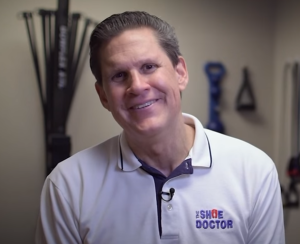Did you know that over 16% of adults suffer from hip pain at some point in their lives? If you’re one of them, orthotics could be the game-changer you’ve been searching for. These custom-made orthotic insoles are not just for foot issues; they can also alleviate hip discomfort by correcting alignment and providing support. Whether you’re an athlete pushing your limits or a daily walker feeling the strain, orthotics might be the key to a pain-free life. In this guide, we’ll explore who should consider orthotics, how they work, and the benefits they offer to those battling hip pain.
Understanding Hip Pain
Before exploring who should consider orthotics, it’s important to understand the common causes of hip pain. Hip pain can arise from various issues, including arthritis, where osteoarthritis or rheumatoid arthritis leads to inflammation and discomfort in the hip joint. Bursitis, the inflammation of the bursae—fluid-filled sacs that cushion bones, tendons, and muscles—can also result in significant pain. Tendinitis, which is the inflammation of tendons in the hip area often caused by overuse, is another common source of discomfort. A hip labral tear, involving a tear in the ring of cartilage that follows the outside rim of the hip joint socket, can also cause pain.
Additionally, hip fractures, frequently due to falls or accidents, especially in older adults, are a significant cause of pain. Hip dysplasia, a condition where the hip socket doesn’t fully cover the ball portion of the upper thighbone, can lead to dislocation and subsequent pain. Lastly, muscle strain, resulting from overuse or injury to the muscles surrounding the hip, can lead to considerable discomfort.
The Role of Orthotics in Hip Pain Management
Custom orthotics serve as specialized support for your feet, designed to correct biomechanical issues that can impact not only your feet but also your hips. Think of your feet as the foundation of a structure—if the foundation is misaligned, the entire structure, including your hips, can experience discomfort.
By wearing custom orthotics, you provide your feet with the necessary support to ensure proper alignment. This adjustment helps alleviate foot discomfort and reduces the strain on your hips, offering a targeted approach to managing hip pain.
One of the key benefits of orthotics is their ability to evenly distribute your body weight as you walk or stand, minimizing stress on your hips and promoting better posture. For those dealing with hip pain, custom orthotics could be the solution that enhances comfort and facilitates smoother movement.
How Hip Pain Can Turn Your Life Upside Down
Hip pain is more than just an inconvenience—it can completely disrupt your daily life. Imagine the simplest tasks—walking, standing, even sitting down—becoming painful challenges. The freedom to move as you please slips away, replaced by frustration and a creeping loss of independence. For those with chronic hip pain, everyday activities like getting dressed, climbing stairs, or driving can feel like insurmountable hurdles, stripping away the ease and confidence that once defined your day.
But the impact doesn’t stop there. As you instinctively shift your posture or alter your gait to avoid the pain, you might find yourself dealing with a domino effect of new problems: lower back pain, knee discomfort, and even foot issues. This chain reaction can leave your entire body in a state of discomfort, making the initial hip pain just one part of a much larger problem.
The toll of chronic hip pain isn’t just physical; it reaches deep into your mental and emotional well-being. The constant pain can lead to feelings of depression, anxiety, and social isolation as you start to avoid activities you once loved. Even sleep doesn’t offer a reprieve—pain can rob you of rest, leading to fatigue and a foggy mind during the day. Over time, this relentless cycle of physical and emotional strain can severely diminish your quality of life, underscoring the critical need for effective pain management and treatment.
Who Should Consider Orthotics?
Orthotics can be a game-changer for those struggling with hip pain, but they’re not a one-size-fits-all solution. Certain individuals are more likely to benefit from these specialized devices, depending on the nature of their condition, lifestyle, and underlying causes of pain. Here’s a closer look at who should consider orthotics:
Individuals with Flat Feet or High Arches
People with flat feet or high arches often face misalignment in their lower body, which can lead to hip pain. The absence of natural arch support in flat feet or the excessive arch in high arches can cause an uneven distribution of weight across the feet. This imbalance can extend up the kinetic chain, affecting the hips and leading to discomfort.
Custom orthotics are designed to correct these specific alignment issues. For those with flat feet, orthotics provide the necessary arch support to reduce the inward roll of the foot (overpronation), which can relieve the stress on the hips. For individuals with high arches, orthotics offer cushioning and support, helping to distribute weight more evenly and reduce the strain on the hips.
Athletes and Active Individuals
Athletes and those with active lifestyles are prone to repetitive stress injuries due to the physical demands of their activities. Running, jumping, and other high-impact exercises can take a toll on the hips, especially if there are existing alignment issues or muscle imbalances.
Orthotics can enhance performance and prevent injury by providing additional support and correcting biomechanical issues during movement. They help absorb shock, reduce the impact on the hips, and promote proper alignment, allowing athletes to maintain their activity levels with less risk of hip pain.
Older Adults with Osteoarthritis
Osteoarthritis is a common issue among older adults, particularly in weight-bearing joints like the hips. This degenerative joint disease can lead to pain, stiffness, and reduced mobility, significantly impacting the quality of life.
Orthotics can be a valuable part of an osteoarthritis management plan. By providing cushioning and support, orthotics help reduce the stress on the hip joints, making daily activities like walking and standing more comfortable. This can also slow the progression of joint damage and help maintain mobility.
People Recovering from Hip Surgery
After hip surgery, such as a hip replacement, the body needs time to heal and adjust. Proper alignment is crucial during the recovery phase to prevent complications and ensure a smooth rehabilitation process.
Orthotics can support this recovery by helping to maintain correct posture and reducing unnecessary strain on the hip joint. They can also help balance the body, particularly if the surgery has affected leg length or gait. This support can lead to a quicker, more comfortable recovery.
Individuals with Leg Length Discrepancy
A leg length discrepancy, where one leg is shorter than the other, can cause uneven stress on the hips, leading to pain and discomfort over time. This condition can be congenital or develop after an injury or surgery.
Orthotics can address this discrepancy by adding a lift to the shorter leg, promoting even weight distribution and reducing the strain on the hips. This can alleviate pain and prevent further complications associated with uneven leg lengths.
People with Gait Abnormalities
Gait abnormalities, such as limping or an uneven stride, can place extra stress on the hips. These issues might arise from various conditions, including neurological disorders, injuries, or structural imbalances.
Orthotics can help correct these gait abnormalities by providing the necessary support and alignment for a more natural walking pattern. By improving gait, orthotics reduce the undue stress on the hips, alleviating pain and promoting better overall mobility.
Individuals with Chronic Hip Pain
Chronic hip pain that persists despite other treatments can be frustrating and debilitating. For some, this pain may stem from underlying issues related to foot and leg alignment, which can be effectively addressed with orthotics.
Orthotics can offer a non-invasive solution for managing chronic hip pain by targeting the root cause of the discomfort. By improving alignment and reducing stress on the hips, orthotics can provide significant relief and enhance the overall quality of life for those suffering from long-term pain.
Pregnant Women
Pregnancy often leads to significant changes in gait and posture because of the increased weight and shifts in the center of gravity. As the body adapts to support the growing baby, the added weight can strain the hips and lower back, resulting in discomfort and pain. Orthotics, designed to provide targeted support, can help manage these changes by redistributing weight and stabilizing the foot and ankle. By improving alignment and reducing the strain on the hips, orthotics can significantly alleviate pregnancy-related hip pain, enhancing overall comfort and mobility during this crucial period.
Consulting a Specialist
When experiencing hip pain, it’s essential to consult a specialist for a thorough evaluation. A physiotherapist can identify root causes like muscle imbalances or joint misalignments, while a podiatrist examines foot-related issues affecting hip health. Discussing previous treatments with these professionals ensures a personalized, effective approach to pain relief and improved mobility.
Physiotherapist Evaluation
When experiencing hip pain, individuals should consult a physiotherapist for a thorough examination. This evaluation helps in identifying the root cause of the discomfort and determining if orthotics are necessary.
Getting assessed by a physiotherapist is crucial as they specialize in hip-related issues. They can pinpoint specific problems such as muscle imbalances, joint misalignments, or gait abnormalities that may contribute to the pain.
Podiatrist Consultation
A podiatrist is another professional to consider for hip pain evaluation. They focus on how the feet and lower limbs impact the body’s overall alignment and function, which can influence hip health.
It’s essential to seek advice from a podiatrist to assess any potential foot-related issues that could be causing or exacerbating hip pain. Addressing these underlying problems can lead to improved hip function and reduced discomfort.
Previous Treatments Discussion
During consultations with physiotherapists or podiatrists, it’s vital to discuss any prior treatments or therapies attempted for hip pain relief. Providing this information gives specialists a comprehensive understanding of the individual’s condition.
Sharing details about past interventions such as medications, exercises, or lifestyle modifications helps professionals tailor their approach effectively. This collaborative effort ensures that the treatment plan aligns with the patient’s needs and goals.
How to Choose the Right Orthotics
Choosing the right orthotics is a personalized process that requires careful consideration of various factors. Consulting with a healthcare professional is essential to ensure the correct fit and functionality. Factors such as individual foot shape, activity level, and lifestyle must be evaluated. A trial and error approach can also help determine the best orthotic solution.
Consulting with a Healthcare Professional
Before purchasing orthotics, it’s essential to consult with a healthcare professional, such as a podiatrist, orthopedist, or physical therapist. They can assess your condition, evaluate your gait, and recommend the most appropriate custom orthotics based on your specific needs. A professional assessment can also help determine whether custom-made orthotics are necessary or if over-the-counter options will suffice.
Individual Considerations
When choosing customized foot orthotics, it is crucial to consider your foot shape. Each person’s feet are unique, so orthotics should be tailored to fit perfectly. By addressing specific pain areas, such as the foot arch, you can ensure maximum support and relief.
Activity Level and Lifestyle
Evaluate your level of activity and lifestyle needs before choosing orthotic options. For those with an active lifestyle, durable and supportive orthotics are essential. Conversely, individuals with a more sedentary lifestyle may prioritize comfort over performance in their choice of orthotic material.
Trial and Error Approach
To find the most suitable orthotics, it is recommended to try different types. Experimenting with various custom foot orthoses allows you to determine which ones offer the best fit and comfort level. Consulting a specialist can provide valuable insights into the most appropriate custom orthotics1 for your specific requirements.

Monitoring and Adjusting Your Orthotic Use
Monitoring the impact of orthotics on your hip health is of paramount importance. It is essential to be attentive to any changes in how your hip feels while wearing orthotics, including the development of new discomfort or pain. Should you experience any alterations in your symptoms, it is advisable to consult with your healthcare provider or a specialist who is well-acquainted with your medical history.
Your healthcare provider can conduct a thorough evaluation of your orthotics to determine if they require adjustments or replacement. Over time, the effectiveness of orthotics may diminish due to changes in your body or wear and tear on the devices themselves. Regular assessments are necessary to ensure that your orthotics continue to provide the support and relief they were designed for.
By actively monitoring your condition and seeking professional advice when needed, you can ensure that your orthotics remain effective and contribute to the long-term health and comfort of your hips. This proactive approach helps maintain optimal function and can prevent potential issues from escalating.
Summary
In considering orthotics for your hip pain, it’s crucial to understand their role, who should opt for them, the importance of consulting a specialist, and how to select the right ones. Orthotics can significantly alleviate hip discomfort and improve your overall mobility and quality of life. By identifying if you’re a suitable candidate for orthotics and seeking expert advice, you can effectively manage your hip pain and enhance your daily activities.
Choosing the appropriate orthotics tailored to your needs ensures maximum benefits and comfort, leading to better hip health and functionality. Remember, taking proactive steps toward addressing your hip pain with orthotics can make a substantial difference in how you feel and move every day.
Frequently Asked Questions
Who can benefit from using orthotics for hip pain?
Orthotics can be beneficial for individuals experiencing hip pain due to various reasons such as overpronation, flat feet, or misalignment issues. If you have discomfort in your hips related to these factors, orthotics could help alleviate the pain and improve your overall hip function.
How do orthotics help manage hip pain?
Orthotics are designed to provide support, stability, and alignment to the feet and lower body. By correcting biomechanical issues and improving foot function, orthotics can help reduce stress on the hips, promote proper gait mechanics, and alleviate hip pain caused by poor alignment or abnormal foot mechanics.
Can I get orthotics without consulting a specialist?
While over-the-counter orthotic inserts are available, it’s recommended to consult a specialist such as a podiatrist or orthopedic doctor before getting custom orthotics. A specialist can assess your specific needs, diagnose underlying issues causing hip pain, and recommend the most suitable type of orthotics for your condition.
How do I choose the right orthotics for my hip pain?
Choosing the right orthotics involves considering factors like the cause of your hip pain, your foot structure, activity level, and footwear preferences. A specialist can perform a thorough evaluation to determine the best type of orthotics for you, whether it’s rigid, semi-rigid, or soft orthotic devices tailored to address your specific needs.
Are orthotics, insoles, a long-term solution for managing hip, knee, and ankle pain?
Orthotics can provide long-term relief for hip pain when used correctly and in conjunction with other treatments like physical therapy or exercise. Regular follow-ups with your healthcare provider can ensure that your orthotics are still effective and make any necessary adjustments to maintain their benefits in managing hip pain.
Alleviate Hip Pain with Custom Orthotics from The Shoe Doctor!
Are you struggling with hip pain that affects your daily life? Proper foot support is crucial, and custom orthotics designed specifically for you can be the solution. These personalized orthotics not only help reduce hip pain but also improve your posture and overall well-being.
At The Shoe Doctor, we bring over twenty years of expertise in crafting custom orthotics tailored to individual needs, including hip pain relief. Our mission is to provide orthotics that alleviate discomfort, offer essential support, and enhance stability in every step you take.
Russell, our dedicated specialist, ensures that your orthotics are perfectly fitted to your feet using precise 3D foot mappings and state-of-the-art technology. By partnering with the Spine & Injury Medical Center in San Jose, California, we adopt a holistic approach to address hip pain challenges.
Ready to find relief? If you’re in the South San Francisco Bay Area, The Shoe Doctor is your go-to destination for custom orthotics designed to alleviate hip pain and improve your quality of life. Begin your journey to pain relief with a complimentary initial consultation.
Don’t wait—schedule your consultation today and experience the benefits of custom orthotics with The Shoe Doctor!
Disclaimer
The materials available on this website are for informational and entertainment purposes only and not to provide medical advice. You should contact your doctor to obtain advice concerning any particular issue or problem. You should not act or refrain from acting based on any content included in this site without seeking medical or other professional advice. The information presented on this website may not reflect the most current medical developments. No action should be taken in reliance on the information contained on this website and we disclaim all liability for actions taken or not taken based on any or all of the contents of this site to the fullest extent permitted by law.


